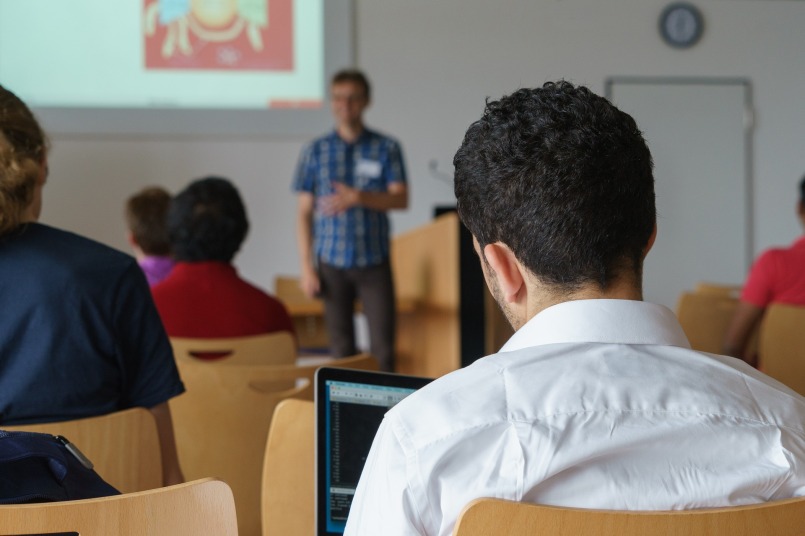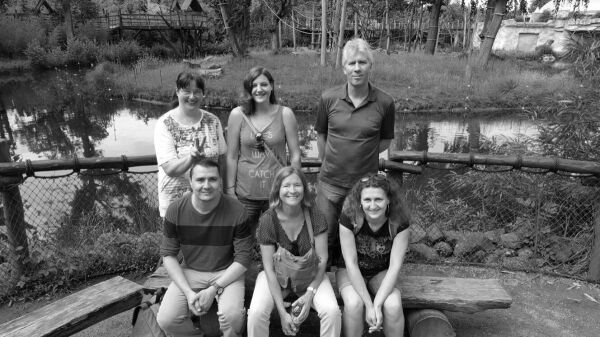B.Sc. Teacher Training in Technics (HRSGe)
Study period
6 semesters (3 years)
Credits
180
Study begin
Winter semester
Study place
Campus Essen
Language
German
Description
The 6-semester Bachelor of Science BK Teacher Training in Technics imparts fundamental subject-specific, subject-didactic, educational science and vocational pedagogical knowledge and methodological skills.
Technical knowledge and skills are the most important production factors of the 21st century. The need to give technology a higher status as a general education subject and to expand it further becomes clear against the background of an increasingly obvious shortage of well-trained specialists in the field of technical occupational areas.
These human resources are decisive for the future of a country. Today, technology teaching is already one of the subjects in which there is a considerable shortage of qualified teachers. Accordingly, it can be assumed with great certainty that trained technology teachers will have excellent chances of being hired and permanently employed in the teaching profession in the future.
Study at UDEStudy plan
Study plan
[Study plan]
Study plan
You can find the examination regulations for your study program here: Examination regulations according to study programs
Study plans as well as information about the modules in the study program can be found here.
Information material
Prospective students will find an overview of the study program here as well as FAQs.
Current information on exams, practice and research project selection, and other relevant topics can be found here.
Further information about the B.Sc. Teacher Training in Technics can be found at: Teacher training in Technics
Study plan as well as information about the modules in the study program can be found here.
Admission
Admission requirements
- General university entrance qualification (Abitur)
- subject-related university entrance qualification (not the advanced technical college entrance qualification!)
- a certificate of education recognized as equivalent. On this page you will find further information.
- Access without the Abitur is regulated by the Ordinance on University Access for Those Qualified in Vocational Education of March 8, 2010. Information on this can be found in the enrollment department.
Admission
Admission to the first semester is only possible for the winter semester.
There is currently a local admission restriction for the following subjects: Biology, German, English, Mathematics, Sports and Economics (as major as well as equally weighted vocational subject). According to the current status, all other subjects are free of admission (but with aptitude test if necessary). Further information is available here.
Applications should be submitted online to the Enrollment Office of the University of Duisburg-Essen: www.uni-due.de/studierendensekretariat/startseite.shtml
Prospective students from non-EU countries submit their application to uni-assist. This applies to all German-language bachelor's degree programs and includes applications for admission to specialized studies, for DSH direct admission, and for the preparatory German course.
You do not need to apply separately for the compulsory areas of educational sciences and German for migrant students (DaZ).
Detailed information on the application can be found on the information sheet of the student registrar's office.
Enrollment takes place after receipt of the admission notice or for subjects without admission (with a passed aptitude test for the subjects sports and arts) during the enrollment period in the student registrar's office.
Special enrollment requirements
For all teacher training programs, participation in the online self-assessment (Skala®) of the Center for Teacher Education is a prerequisite for enrollment. Detailed information on the assessments (SkaLa®) can be found here.
Pre-courses
You can find a selection of for non-mandatory, but recommended preliminary courses at Mintroduce.
Language Skills
The language of instruction at the University of Duisburg-Essen is German (except in the English-language programs). Therefore, you must have good German language skills if you want to study successfully. The majority of foreign applicants must pass the "Deutsche Sprachprüfung für den Hochschulzugang" (DSH 2 level; with some exceptions) before beginning their studies.
- German nationals (persons who have acquired their higher education entrance qualification in Germany or at a German school abroad) do not require any special proof of German language skills.
- Citizens of an EU member state (and citizens of Iceland, Liechtenstein, Norway) or German citizens with a foreign educational qualification, as well as
- Citizens of a country outside the EU with a foreign university entrance qualification must pass the "Deutsche Sprachprüfung für den Hochschulzugang" (DSH 2 level) or the TestDaF (TDN 4) before the begin of their studies.
Information on the German Language Test for University Entrance (DSH)
Further language skills
Knowledge of two foreign languages must be proven by the time of the preparatory service. (usually by means of university entrance qualification)
- This is not an admission requirement for the course of studies; proof must be provided when registering for the preparatory service; it is usually fulfilled by the university entrance qualification.
- Those who can only prove that they have a foreign language with the subject-specific university entrance qualification from the vocational college must acquire and prove that they have a second foreign language during their studies.
- Those who have not learned German as their first language, but have acquired their university entrance qualification in German, only have to prove knowledge of one additional language.
- Exception for the study of teaching profession at vocational colleges with vocational specialization: Here, knowledge of only one foreign language must be proven by the time of the preparatory service.
General Information
Living & Studying at the University of Duisburg-Essen

Semester
The academic year is divided into semesters.
- Winter semester: from October to March
- Summer semester: from April to September

Lecture period
The winter lecture period usually starts in mid-October and ends in mid-February. In summer, the lecture period usually starts in mid-April and ends in July. During the winter semester there is a break of about two weeks during the Christmas holidays.

Examination phase
The examination phase begins about one week after the end of the lecture period and lasts about seven weeks.
Semester fee
All students have to pay a semester fee (social contribution) of about 320,- Euro per semester. You can find the current amount here. The social contribution includes, among other things, a semester ticket for public transportation in North Rhine-Westphalia and discounts on meals in the university's canteen and cafeteria.
Living expenses
We recommend to consider approximately 800 to 1000 Euro of personal expenses per month.
Accommodation
Accommodation is possible in dormitories of the Studierendenwerk and in premises of the free housing market. The rent in a room in a student dormitory is about 300,- Euro per month. You can find more information about housing options here.
Contact
You have questions? We have answers!

Support Center for (International) Engineering Students Student advisory service
V15 R04 H40
Universitätsstr. 15
45141 Essen
Phone: +49 (0)201 183 6500
E-mail: scies-essen@uni-due.de

Student council Lehramt Bautechnik
We are your point of contact! If you have questions about your studies or general concerns about us or our lecturers, you can contact us. We will solve your problems and answer your questions directly if possible or forward you to the right people. Just write us an email (fs.physik-technik@uni-due.de),or via Facebook or on Discord!
For prospective students and enrolled students General student counseling
ABZ offers counseling to prospective students, enrolled students and graduates on all questions concerning the choice of study program, studies and the transition into working career.



